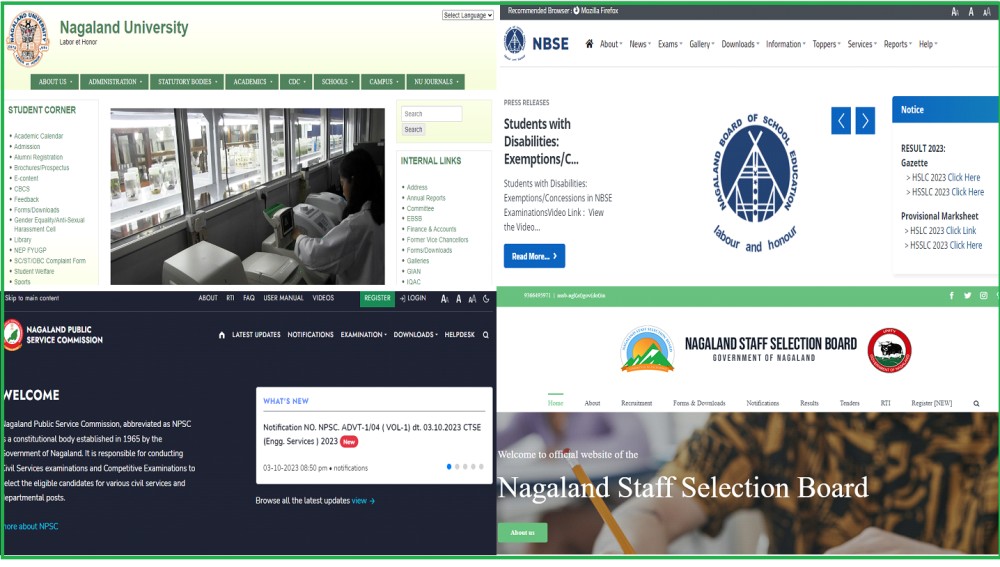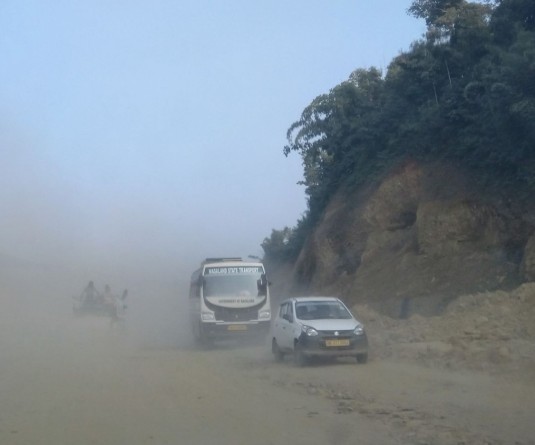A collage of the screenshots of the homepage of NPSC, NSSB, NU and NBSE. (Morung Photo)

NBSE, NU top assessment of recruitment-education oriented websites
Moa Jamir
Dimapur | October 4
Unlike many departmental websites, most education and recruitment/career oriented independent portals under the Nagaland Government have progressively embraced technology and are transforming digital services into a more engaging ecosystem for its citizens, an assessment made by The Morung Express has found.
Virtually, job-focused websites like the Nagaland Public Service Commission (NPSC) and Nagaland Staff Selection Board (NSSB) as well as educational platforms such as the Nagaland Board of School Education (NBSE) and Nagaland University (NU) have been practicing good digital governance.
Top performers
NU: The NU came into being as the sole Central University in Nagaland on September 6, 1994 with jurisdiction over the entire state for higher education.
A cursory assessment of the NU’s website (https://nagalanduniversity.ac.in/English/) exhibited that it trumps over others in terms of digital governance among the websites assessed here.
Besides the robust resources for the students as well as the general public, the website had latest notifications, advertisements, tender, events, exam related activities while the information on internal set-up were comprehensive.
The Annual Reports from 2013-14 to 2021-22 as well as Accounts and other reports were available. The links to Facebook, X and YouTube were also found active and regularly updated.
The notifications on RTI were most updated, though the Suo Motu Disclosure under Section 4 of Right To Information (RTI) Act, 2005 was dated only till 2020.
NBSE: Established by the State Assembly on November 15, 1973, the NBSE started functioning from October 1, 1974 and is empowered to “prescribe, regulate, supervise and develop the educational system of the state up to higher secondary level.”
The NBSE’s website (https://nbsenl.edu.in/) is another treasure trove for students, researcher and general public with question banks, reports and other documents.
Sections such as news, exams, notification and circulars etc are regularly updated while the website also offers various online services, including a mobile application.
The NPSC had one of the most active Facebook and X (formerly Twitter) links.
However, the NBSE falls behind in self-disclosure with no information on composition and administrative set-up, blank ‘Annual Reports’ section and the RTI status only as of March 31, 2014. There were no ‘Tender’ updates.
NPSC: The website of the constitutional body established in 1965 for conducting civil services and competitive examinations to select the candidates for various civil services and departmental posts is highly functional with all relevant resources.
All updates on NPSC’s website (https://npsc.nagaland.gov.in/) are regular, not intermittent, suggesting a well-established framework.
Among others, the ‘About Us’ section had details on composition and administrative set-up of the Commission. The Examination Section dealing with Notifications and Advertisements, Examination, Results, online services etc were all upto date.
However, the RTI manual was outdated on 1st June, 2020 while an Annual Administrative Report (AAR) was missing. There was not a single posting on ‘Tender’ section.
Links to NPSC’s Facebook, X and YouTube were integrated within the website but not active.
NSSB: Officially approved for constitution on July 4, 2020, the NSSB came into force on July 31 and mandated to act as the Board for “all direct recruitment of Group-C posts previously recruited by the Departmental Recruitment Board.”
Though not exhaustive as NPSC, the NSSB’s website (https://nssb.nagaland.gov.in/) checks all the relevant ‘About Us’ and recruitment related sections as well as updates and online services.
The RTI disclosure was also relatively new, dated July 19, 2022. However, no AAR was found while ‘Tender’ section had just one post. Links to social media accounts take users only to the homepage.
Others
SCERT: The State Council of Educational Research and Training (SCERT) is the apex academic body in the State for bringing about qualitative changes in school education, particularly, Teacher Education. Since 1986, it has a full-fledged directorate.
The ‘About Us’ section on SCERT website (https://scert.nagaland.gov.in) is robust with relevant information, including list of academic and ministerial officers as on April 27, 2022.
News & Event and Download sections were more or less similar, and updated till October 3, but updates were intermittent.
“Programs & Functions” had the latest Curriculum and Syllabus but some categories were dated. No publication or research papers worthy of the body were found. There was no RTI, AAR, or social media link. The website needs a major reorganisation.
NECTAR: The World Bank-supported Nagaland Education Project- The Lighthouse – Nagaland Enhancing Classroom Teaching and Resources (NECTAR) is aimed at improving the quality of Government schools in the State. While no timeline is given on the NECTAR’s website, the DoSE reportedly launched the project in April 2021.
The website (https://nagalandeduproject.com) also presents contrasting results, with ‘News’ section showing flurry of activities during the 2nd half of 2021 and 2022, and remaining ‘inactive’ thereafter, with last update on September 21, 2022.
Meanwhile, the most important and relatively up-do-date categories such as advertisements, notifications and documents are put under ‘Others’ section, and therefore not immediately visible.
There is no publication on the status, annual or other relevant reports related with the project. There was no RTI.
Incidentally, NECTAR’s three social media account - Facebook, X and Instagram had the latest regular updates but these are reflected on its website, requiring a major overhaul.
SIRD: The State Institute of Rural development (SIRD), established in 1990 is the apex training institute for rural functionaries. On a positive note, the SIRD website (https://sird.nagaland.gov.in/) had three AARs including 2022-23 as well as the latest RTI and Training Calendar.
However, it had limited resources. ‘News & Events’ link had no postings, while ‘Research’ section had no documents just titles. ‘Organisational Structure’ was working in ‘Latest Post’ section but blank in another link on the Homepage, suggesting a lack of coordination. Posts on Links social media accounts were either inactive or not working. The website requires major streamlining.
ATI: The Administrative Training Institute (ATI) is the apex training institute and the consultancy arm of the Government of Nagaland established in 1972. The ATI’s website (https://ati.nagaland.gov.in/), however, is minimalistic, at best.
While ‘Training Calendar’ section is shown to be under development, the RTI link was not working. Overall, it requires a major revamp.
DoSE, DHE and DTE
The Department of School Education, Technical and Higher Education have been assessed in the part-one of the series concerning department websites published on September 11.
The DoSe, then was slotted in ‘Good’ category while DTE and DHE were ranked ‘Average’. The department also operates an online education services portal (https://dosenl.in/).
This is the part-five of a series on assessment of digital governance of departments and agencies under the Government of Nagaland






